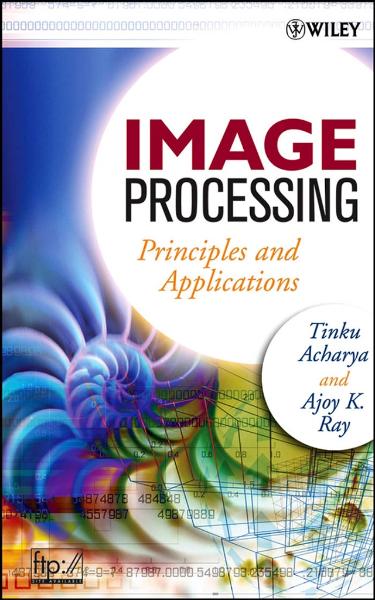اصول و کاربردهای پردازش تصویر
با استفاده از تکنیک های پردازش تصویر میتوان دگرگونی اساسی در خطوط تولید ایجاد کرد. بسیاری از پروسههای صنعتی که تا چند دهه پیش پیاده سازی شان دور از انتظار بود، هم اکنون با بهره گیری از پردازش هوشمند تصاویر به مرحله عمل رسیدهاند. از جمله منافع کاربرد پردازش تصویر به شرح زیر است:
- افزایش سرعت و کیفیت تولید
- کاهش ضایعات
- اصلاح روند تولید
- گسترش کنترل کیفیت
کتاب اصول و کاربردهای پردازش تصویر (Image Processing Principles and Applications)، مشتمل بر 452 صفحه، در 18 فصل، با فرمت PDF، به زبان انگلیسی، همراه با تصاویر به ترتیب زیر گردآوری شده است:
Chapter 1: Introduction
- Fundamentals of Image Processing
- Applications of Image Processing
- Human Visual Perception
- Components of an Image Processing System
- Organization of the book
- How is this book different
- Summary
Chapter 2: Image Formation and Representation
- Introduction
- Image formation
- Sampling and Quantization
- Binary Image
- Three-Dimensional Imaging
- Image file formats
- Some Important Notes
- Summary
- References
Chapter 3: Color and Color Imagery
- Introduction
- Perception of Colors
- Color Space and Transformation
- Color Space Quantization and Just Noticeable Difference
- Color Interpolation or Demosaicing
- Summary
Chapter 4: Image Transformation
- Introduction
- Fourier Transforms
- Discrete Cosine Transform
- Walsh-Hadamard Transform (WHT)
- Karhaunen-Loeve Transform or Principal Component Analysis
- Summary
Chapter 5: Discrete Wavelet Transform
- Introduction
- Wavelet Transforms
- Extension to Two-Dimensional Signals
- Lifting Implementation of the DWT
- Advantages of Lifting-Based DWT
Summary
Chapter 6: Image Enhancement and Restoration
- Introduction
- Spatial Image Enhancement Techniques
- Distinction between image enhancement and restoration
- Histrogram based Contrast Enhancement
- Frequency Domain Methods of Image Enhancement
- Noise Modeling
- Image Restoration
- Image Reconstruction by Other Methods
- Summary
Chapter 7: Image Segmentation
- Preliminaries
- Edge Detector
- Edge, Line, and Point Detection
- Image Thresholding Techniques
- Region Growing
- Waterfall algorithm for segmentation
- Connected component labeling
- Document Image segmentation
- Summary
- References
Chapter 8: Recognition of Image Patterns
- Introduction
- Decision Theoretic Pattern Classification
- Bayesian Decision Theory
- Nonparametric Classification
- Linear Discriminant Analysis
- Unsupervised Classification Strategies - clustering
- K-Means Clustering Algorithm
- Syntactic Pattern Classification
- Syntactic Inference
- Symbolic Projection Method
- Artificial Neural Networks
- Summary
Chapter 9: Texture and Shape Analysis
- Introduction
- Gray Level Cooccurrence Matrix
- Texture Spectrum
- Texture Classification using Fractals
- Shape Analysis
- Active Contour Model
- Shape Distortion and Normalization
- Contour-Based Shape Descriptor
- Region Based Shape Descriptors
- Gestalt Theory of Perception
- Summary
Chapter 10: Fuzzy Set Theory in Image Processing
- Introduction to Fuzzy Set Theory
- Why Fuzzy Image
- Introduction to Fuzzy Set Theory
- Preliminaries and Background
- Image as a Fuzzy Set
- Fuzzy Methods of Contrast Enhancement
- Image Segmentation using Fuzzy Methods
- Fuzzy Approaches to Pixel Classification
- Fuzzy c-Means Algorithm
- Fusion of fuzzy logic with neural networks
- Summary
Chapter 11: Image Mining and Content-Based Image Retrieval
- Introduction
- Image Mining
- Image Features for Retrieval and Mining
- Fuzzy Similarity Measure in an Image Retrieval System
- Video Mining
- Summary
Chapter 12: Biometric And Biomedical Image Processing
- Introduction
- Biometric Pattern Recognition
- Face Recognition Using Eigenfaces
- Signature Verification
- Preprocessing of Signature Patterns
- Biomedical Image Analysis
- Biomedical Imaging Modalities
- X-Ray Imaging
- Dental X-Ray Image Analysis
- Classification of Dental Caries
- Mammogram Image Analysis
- Summary
Chapter 13: Remotely Sensed Multispectral Scene Analysis
- Introduction
- Satellite sensors and imageries
- Features of Multispectral Images
- Spectral reflectance of various earth objects
- Scene Classification Strategies
- Spectral classification-A knowledge-Based Approach
- Spatial Reasoning
- Other Applications of Remote Sensing
- Summary
Chapter 14: Dynamic Scene Analysis: Moving Object Detection and Tracking
- Introduction
- Problem Definition
- Adaptive Background Modeling
- Connected Component Labeling
- Shadow Detection
- Principles of Object Tracking
- Model of Tracker System
- Discrete Kalman Filtering
- Extended Kalman Filtering
- Particle Filter Based object Tracking
- Condensation Algorithm
- Summary
Chapter 15: Introduction to Image Compression
- Introduction
- Information Theory Concepts
- Classification of Compression algorithms
- Source Coding Algorithms
- Huffman Coding
- Arithmetic Coding
- Summary
Chapter 16: JPEG: Still Image Compression Standard
- Introduction
- The JPEG Lossless Coding Algorithm
- Baseline JPEG Compression
- Summary
Chapter 17: JPEG2000 Standard For Image Compression
- Introduction
- Why JPEG2000
- Parts of the JPEG2000 Standard
- Overview of the JPEG2000 Part 1 Encoding System
- Image Preprocessing
- Compression
- Tier-2 Coding and Bitstream Formation
- Summary
Chapter 18: Coding Algorithms in JPEG2000 Standard
- Introduction
- Partitioning Data for Coding
- Tier-1 Coding in JPEG2000
- Tier-2 Coding in JPEG2000
- Summary

جهت دانلود کتاب اصول و کاربردهای پردازش تصویر (Image Processing Principles and Applications)، برلینک زیر کلیک نمایید.
